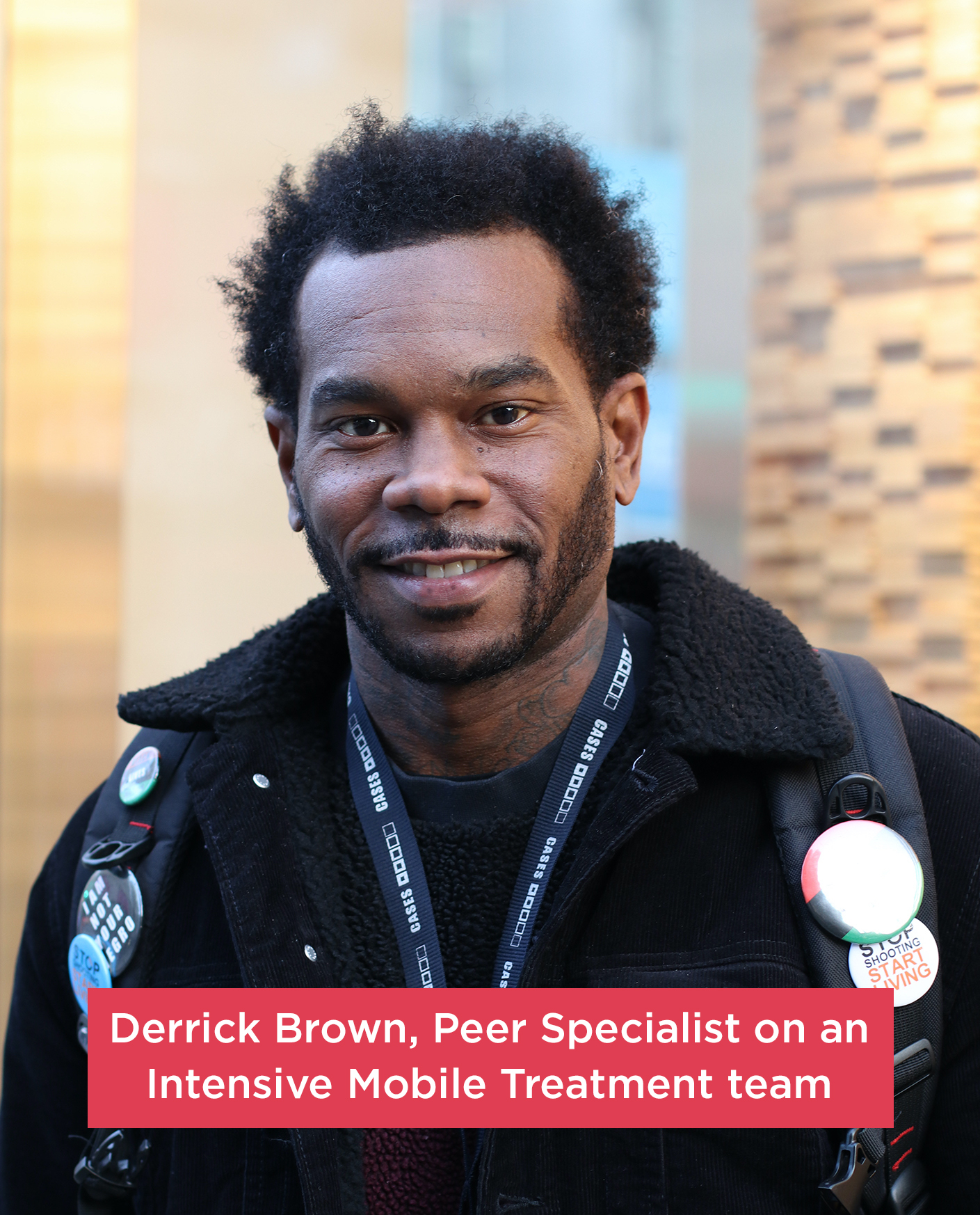Intensive Mobile Treatment: A peer specialist delivering care
 Derrick Brown speaks from experience. He knows what it feels like to not know where his next meal will come from, or where he’ll sleep the next night. He knows how to navigate the complex criminal justice system, and the stigma that comes with a record. He knows the weight of mental health and substance use challenges. He’s lived them.
Derrick Brown speaks from experience. He knows what it feels like to not know where his next meal will come from, or where he’ll sleep the next night. He knows how to navigate the complex criminal justice system, and the stigma that comes with a record. He knows the weight of mental health and substance use challenges. He’s lived them.
For new clients to the Center for Alternative Sentencing and Employment Services’ (CASES) Brooklyn Intensive Mobile Treatment team, Derrick’s is usually the first face they see. That’s by design.
“Our peers are normally the first point of contact with our clients,” says Patricia Haversham-Brown, Director of Intensive Mobile Treatment at CASES. “They’re able to say, ‘I slept in that same park, I slept under that bridge’ – and connect with a client without talking down to him.”
Every morning, Derrick joins a team meeting to discuss client needs. In addition to Derrick and another Peer Specialist, the full team includes a team leader, three behavioral health specialists, a registered nurse, a nurse practitioner, and a program assistant. Every team member serves every client, providing extensive, wraparound support – from administering psychiatric meds to taking clients to parole meetings, to finding permanent housing.
Of all the team members, peers typically spend the most time engaging with clients – Derrick might see as many as 5 people a day. When he first meets with a new client, he works to help them understand all the services available. From there, Derrick helps the client with whatever they need. When one client had her food stamps cut, it was Derrick who jumped the hurdles to get them reinstated. When another client’s green card expired – through no fault of his own – CASES paid for another one. Derrick did the legwork to make it happen. When a client who was involved in a high-profile criminal case in a subway station didn’t feel comfortable riding the subway, Derrick jumped in a cab to take him to his appointment.
As clients open up to Derrick, he shares what he learns with the whole team, so they can better meet the client’s needs. This deeply personal approach is a signature of the Intensive Mobile
Treatment program, and a major factor behind their tremendous success citywide. These are clients who have been poorly served by traditional models of care – often for years. Instead of letting people continue to fall through the cracks in the mental health, criminal justice and homeless service systems, Intensive Mobile Treatment teams are there to offer the support and care they need.
Haversham-Brown says that peers like Derrick are a key part of that work: “Derrick shows people, ‘This is where I am, and this is where I’ve come from.’ To give them an opening to see they can also change their lives.”
AT A GLANCE: Intensive Mobile Treatment
• Full-service mental health treatment teams include psychiatrists, social workers, case managers, nurses, and peer specialists
• Teams serve clients who have:
o Had recent and frequent contact with the mental health, criminal justice, and homeless service systems,
o Displayed recent behavior that is unsafe and escalating, and
o Been poorly served by traditional treatment models
.
FAST FACTS
• Currently, there are 11 Intensive Mobile Treatment teams in New York City, with the capacity to serve 297 clients at any given time
• Since 2016, 91% of Intensive Mobile Treatment clients have continued to receive services for a year or more
• Since 2016, half of Intensive Mobile Treatment clients experiencing homelessness have secured non-shelter housing while working with Intensive Mobile Treatment teams
.